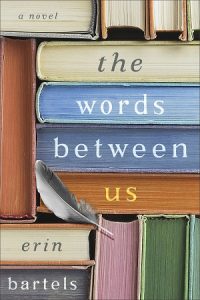Erin Bartels has penned a thoughtful and lyrical tale in The Words Between Us (Revell). With evocative prose that recalls the classic novels we love, she fashions a story that shows that words—the ones we say, the ones we read, and the ones we write—can help us form our own identity and assist us in finding our way again. In this interview, Erin talks about the value of classic works of literature, discusses the central theme(s) of her new book, and explains what she really hopes readers get out of the experience…
The Words Between Us is a celebration of the written word. Erin, you’ve stated that books help us to form our own identity. Can you please expound upon this statement?
 I think this is true on two levels—individually and as a culture. The books we read as individuals affect our views on history, ethics, bravery, love, family, friendship, war, sacrifice, and so much more. Every story I read is another layer of sediment laid down inside my psyche, building up the edifice that is me.
I think this is true on two levels—individually and as a culture. The books we read as individuals affect our views on history, ethics, bravery, love, family, friendship, war, sacrifice, and so much more. Every story I read is another layer of sediment laid down inside my psyche, building up the edifice that is me.
And this happens on the level of culture. Our cultural identity is tied up in the works of art and entertainment we produce and consume—we write to convey some truth, and we believe that truth because of things we have already read, which someone else wrote for us.
It’s a fascinating cycle, rolling slowly on into the future. Along the way, we discard what we no longer value and pick up new works that speak to us.
The Words Between Us explores all aspects of life, including family, loss, love, coming-of-age, betrayal, regret, and forgiveness. Is there one particular theme that you really focus on?
To me, this story is about friendship and coming-of-age—of maturing to the point that we stop looking for excuses and start taking responsibility for the things we’ve done that have hurt others.
I think that’s a fundamental difference between an adult who behaves like an adult and one who behaves like an adolescent—a willingness to accept blame as readily as we accept praise. And then to move on from there with a humble and generous spirit.
The Words Between Us explores some of the classics. How did you develop your love for the classics?
I’m sure every writer claims to be a big reader. That’s nothing new. But when I was in school, I was truly insatiable. I skipped eighth grade English just by asking my school counselor if I could, because I’d been bored in seventh grade English.
I took every English class available in my high school, including honors classes and AP English. I majored in English language and literature in college. So, as you can imagine, I read a lot of the classics. Even those I didn’t read as an assignment I have collected along the way and read.
Though, to my chagrin, I’ve never read Dickens. (Truthfully, I have always been more attracted to the American literary tradition than the British.)
You emphasize the importance of trusting the words and lessons found in the pages of the classics. How have the classics impacted your own life, and what role do they play in The Words Between Us?
I’m not sure I’d say people should model their lives or behaviors on their reading of the classics. I think you’ll find far more unlikeable, frustrating, selfish, and even despicable main characters in the classics than you’ll find in modern commercial fiction since there is so much pressure on authors to make their characters likeable, or at least relatable. I’m not even sure that reading the classics increases empathy like reading modern fiction does.
In my own life, the classics made me fall in love with the written word and understand its power to elicit emotions in the reader, even if those emotions aren’t always positive. In The Words between Us the classics act as a bridge between two people, one of whom is open and honest while the other is lying about who she is and where she came from.
But she can be honest when she’s talking about these books. And through their exchange of classic novels, these two young people are able to form a real friendship.
What do you hope readers will gain from reading your book?
I really hope that some people will finish the book and feel compelled to call someone—a friend, an ex, a parent, a child—to apologize for something that drove a wedge between them. And I hope that some of them will pick up a book they were supposed to read in high school that they Cliffs-Noted their way through and finally read it for real!
Visit Erin Bartels’ author page:
https://www.familyfiction.com/authors/erin-bartels



